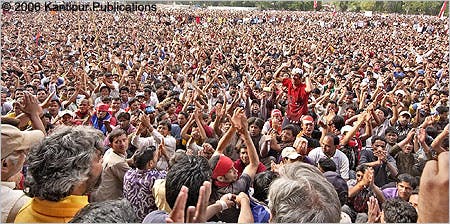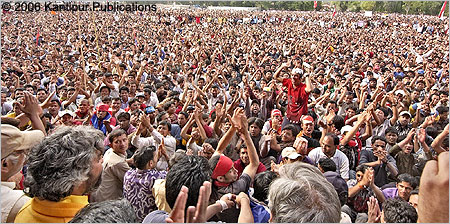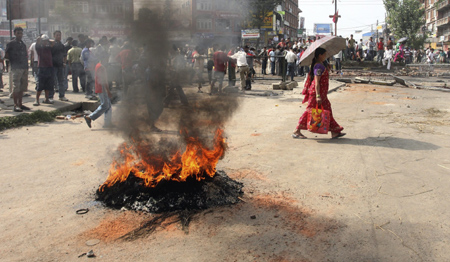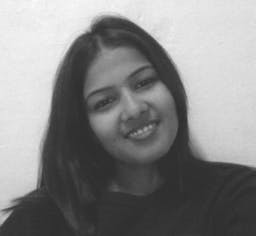IS DEMOCRACY READY FOR US?
Jan 21, 2015
Story



I remember sending an e-mail to a family friend immediately after democracy was ushered in our country after the prolonged people’s struggle, the non-ending revolution, the 20-hour curfews, and loss of lives of so many. I was excited about everything democracy would bring. Yes, freedom, sweet freedom, that’s all that democracy meant to me then.
My friend, an older and wiser gentleman, wrote back, “Congratulations! But trust me; democracy can never be right for you until you are ready for it.” I don’t know whether I didn’t understand what his statement meant then, or I chose not to understand it. Maybe I didn’t care much for anything that was said against our hard-earned democracy. Democracy finally gave us our fundamental rights. Democracy gave us our freedom.
But today, I see and I understand what he meant. The law and order situation in the country is deteriorating with each day. The mass revolution did bring democracy, but it also brought along with it a lot of other things we do not appreciate. During the insurgency, killing people had become a mere way of taking revenge. The ease with which people are murdered for reasons insignificant has stayed on in an ugly manner. Democracy certainly is a wonderful thing. It gives dignity to an individual. But we had never realized that along with democracy so many vices would tag along.
I came closer to the grisly reality of democracy when my father was kidnapped by an unidentified group on the night of November 19, 2007. I don’t want to recollect the happenings of that particular day, and the days that followed, but I honestly can never forget it. It remains a dark day of my life, and the lives of each of my family members. While Papa was returning from home from work, a group of men stopped his car, injured the driver, blindfolded my father and forced him to run in the jungle for 6 hours. He was later locked in a small hut in the middle of the jungle without any food or water. God bless the local police who left no stone unturned to find him, and we got him back. The day papa returned back was not just a rebirth for him; it was a new life for me, my mother, and all my siblings. We still get threat calls from the kidnappers but we have decided not to live with this constant fear. We have decided to stand up and fight on.
I have questioned the quintessence of democracy ever since that poignant incident. Does democracy mean freeing everyone to do whatever they want, regardless of rules or controls, instructions or boundaries, and right or wrong? I think that’s how people have interpreted democracy in my country, at least. There are so many of us taking advantage of “democracy,” and getting away with appalling actions.
It is also distressing to see how everybody in my country is fighting for “their” rights. Everybody wants to have a chunk for themselves, but how long will we detach “our” needs, “our” aspirations, “our” wants from that of the state? Countrymen’s prosperity is certainly intertwined with the nation’s well-being, but in my country, I cannot fathom why my people have started thinking contrary to this.
Almost each day we get to see and hear about protests. Hundreds and thousands marching on the streets every other day has become a common sight. They dislike something—they throw a bandh (blockage); they are not happy with certain law—they throw a bandh; they are dissatisfied with their wages—they throw a bandh; the questions in the exams are tough—they throw a bandh, hike in food prices, lack of security, microbuses getting torched, someone being beaten, not enough landfill sites... and so many more.
Sometimes, the demands are reasonable and the issues are important, and they certainly need to be addressed. But I believe that calling a bandh does nothing but create logjams and havoc, disrupting normal lives. According to a daily newspaper, The Himalayan Times, the country saw 500 bandhs in 6 months this year. All this rebellion will, perhaps, someday give us all the rights that we deserve. But I worry about today.
Democracy in Nepal has gone through tests many times. It was first introduced in 1951 through an armed revolution against the century-old oligarchic Rana Regime. But in December 1960, King Mahendra usurped power and thereby nipped Nepal’s first incipient democracy in the bud. King Mahendra supplanted democratic rule with the Partyless Panchayat regime, a system that continued until 1990. Multiparty democracy was restored in April 1990 after the people demanded its return through mass protests.
This second era of democracy lasted longer, and witnessed many achievements that are usually associated with a thriving democracy: a new constitution was promulgated, parliamentary elections were held in 1991, 1994 and 1999 and local elections were held in 1992 and 1997. But Nepal’s second stint with democracy was also derailed by the palace. King Gyanendra, through two royal coups in October 2002 and February 2005, usurped power in a manner reminiscent of his father, King Mahendra. The king’s seizure of power antagonized the public who already viewed him with suspicion.
King Gyanendra—who had been crowned after his brother King Birendra along with all members of his family and five other royalties were murdered in June 2001—was not seen as the legitimate heir to the throne, much less accepted as an active and all-powerful head of state. His wresting of total power further alienated him from the masses. The people responded by taking to the streets in Jana Andolan II (People’s Movement II), rallying for republicanism: they wanted a complete extirpation of the institution of monarchy. In the days that followed, the king was ousted from power, and the political parties and the CPN-Maoist cobbled together an interim parliament to run the affairs of the state.
The country was supposed to be forged through processes that would ensure Nepal’s radical departure from its past—a departure from the two-and-a-half century old monarchial rule, and a departure from a decade long People’s war carried out by CPN-Maoists. The processes, however, did not match the transformation, and the country has today ended up suffering in the name of democracy.
It is but natural for a youngster like me to get frustrated at times, to see the carnage, the lawlessness, the corruption, and this culture of impunity. Every time something unpleasant happens in the country, I try to console myself saying that we are a transitional economy, and every economy has to suffer in this stage. But somewhere deep down I ask myself, how fair it is to label the irregularities as the result of the country’s transition? How long will we suffer like this? Isn’t there an end to all this?
The Constituent Assembly had guaranteed multi-party competitive politics, republicanism, and popular sovereignty, but all these have worsened even more. The convergences have been overshadowed by the divergent strategies the political parties adopt to realize their partisan interests, frustrating common people like me, raising doubts that the period of transition might be subverted. We had thought that the rising awareness of the people would help in ensuring some sort of accountability among the political parties, but we were overly optimistic. Neither the political parties, nor the citizens themselves have been able to move on with the spirit that was required to take the nation towards progress.
Of the many sectors that have been affected, the most depressing is to see the impact in the field of education. It disheartens me when I see my generation doing things that I am not at all proud of. Politics in colleges have not only degraded the quality learning environment, but has turned educational institutions into power-play areas.
Student unionism is good unless it meddles with the education system, but our unions are formed with the purpose of meddling. A couple of days back, we were in the examination hall for our second paper of MA Economics. I had completed 60 percent of my paper, when some student union members broke in, snatched everybody’s answer sheets, and in the blink of seconds, all our sheets had turned into shreds. They were protesting the university’s decision over something.
Our student unions are dissatisfied with every decision the university takes. But amidst the differences between the university officials and the student unions, it is ultimately we who suffer. I had done nothing, nor had the other students, but it was our hard work that went into drains. This was my first experience of how insensitive union members could get. I was born blessed to have studied in private schools and colleges all my life, and I never actually knew how politics could disturb education until I joined my present college.
It’s been nearly two years that our session began, and every time the university issued examination notice, the unions would create some problem, and the exams would get postponed. Finally, after so much of wait, they started sadly, theyt got cancelled. Ironically, student unions are formed to represent the interests of the students, but i hardly see them fulfilling their prime role. Yesterday’s event and many more incidences like this prove how our union members like so many others misuse power that has been given to them. All this has affected students who go to college not to fight for power, but to immerse themselves in the light of knowledge.
We cannot also forget what democracy has done to women in my country. We were never safe, and our safety has deteriorated even more. We had thought that life would get better after democracy, but we were wrong. I don’t remember the last time I felt safe. I know that I could be harmed, or raped, or murdered, and the culprit would go free.
Chirag Bangdel, a young Nepali poet has captured the nation’s vulnerability in his poem "Immunity," which I would like to quote here:
“Ten thousand people
on the street, protesting.
Angry words
and slogans,
soon – gunshots,
some run,
some fight on.
Fifty get wounded
and a man of twenty-two dies.
A curfew follows,
lasts five hours.
The next morning
people rush to work
and vendors sell their wares.
Even the blood stains on the road
fade away –
too many cars on the streets.”
What he describes through the poem is so true. We are so used to hearing news of people being killed, that every person who is killed becomes a statistic for others, unless of course, when it happens to one’s own family member(s). This is rather upsetting. We should not forget that with every person killed, we are taking away the hope of a future.This is unfair and shows the dark reality of what we are turning into. We always were considerate, but I don’t understand what has got into us—vice has taken over our beings.
These might be some of the many reasons that so many youth are leaving the country for better lives. It is estimated that on an average, 10 youth leave the country daily to look for greener pastures, which totals to more than 3600 per year. I used to think that people who are giving up on my country at the moment when it needs them the most, are nothing but scapegoats. I had my opportunities to leave as well, but i chose to stay back, but now when I have to go through all this, I question my decision. I wonder if I should run away too. After all my future is important to me. But then, when I again think of all the great things this country has given to me, I am assured that nothing could have been more right than my decision to stay back. We always complain of dirty politics, corrupt politicians, bad roads, not enough water, load shedding, and so many more things. But if everybody runs away for making their future, who is going to look after the country’s future? I have chosen to make a difference, in my own little ways, the first being respecting the democracy that came to us after so much of sacrifice.
This country that we live in was not born yesterday. We have a history. We have wonderful culture and traditions. It is understandable that the entire process will take some time to be accommodated in the system, but I wonder “how long?” Philosopher Paul Woodroff argues that “everybody in the world is ready for democracy, if by 'ready' we mean 'eager’.” Nepalese certainly were eager for democracy, but it doesn’t mean that they were “ready” for it.
The question here, however is, “Is democracy ready for us?” Is it ready to be misused in the name of liberty, in the name of civil supremacy, and in the name of exercising rights?
This article is part of a writing assignment for Voices of Our Future, which is providing rigorous web 2.0 and new media training for 31 emerging women leaders. We are speaking out for social change from some of the most forgotten corners of the world. Meet Us.




